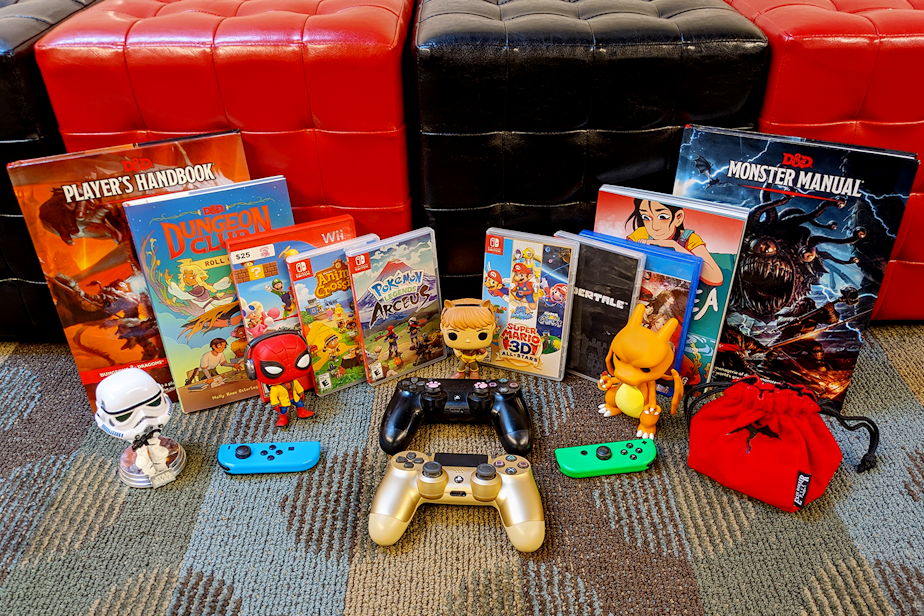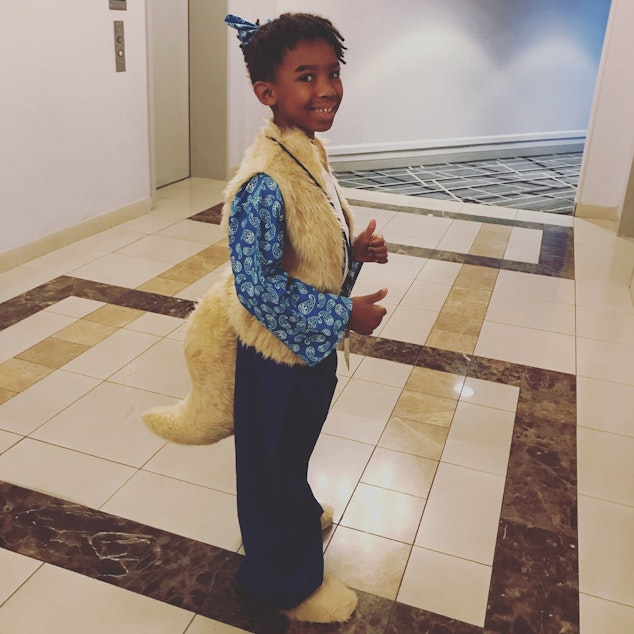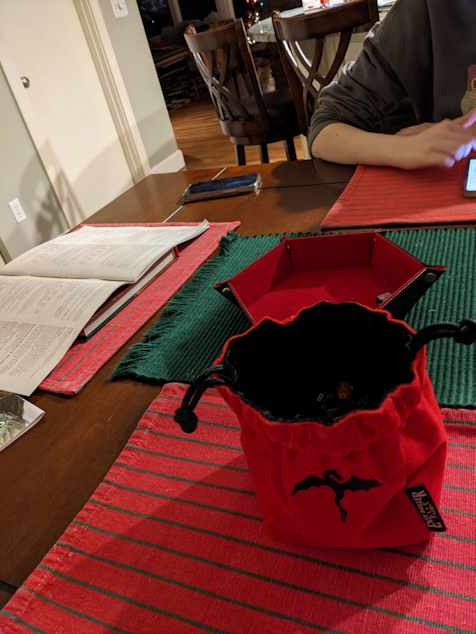How the imaginary worlds of media help us shape our real-world identities

From video games and D&D to fandoms and cosplay, RadioActive's Indigo Mays, Dash Pinck and Carter Ortiz share the stories of people who create and consume media that changes lives.
[RadioActive Youth Media is KUOW's radio journalism and audio storytelling program for young people. This story was entirely youth-produced, from the writing to the audio editing.]
Podcast transcript:
Carter Ortiz: Whenever I turn on my PS4 or PC and load up a video game, I get into the mind of the character I am playing. But I also think back to when my dad first showed me video games.
Dash Pinck: The first role-playing game I ever played was Dungeons & Dragons, and it helped me explore who I am as a young person through fantasy and improv.
Indigo Mays: I can still feel the familiar tingles of excitement while talking to my friend the morning after seeing the first episode of "Moon Knight," and how excited we were for the next one.
Sponsored
Carter: Happiness, escapism, family, connection, excitement, and freedom. These are all things we feel when consuming the media that have defined our identities, and helped us build community.
Carter: I’m Carter Ortiz.
Dash: I’m Dash Pinck.
Indigo: And I’m Indigo Mays.
Carter: We’re producers for KUOW's RadioActive Youth Media, a place where teens learn how to produce radio.
Sponsored
Today, we are going to share the stories of people who create and consume media that changes lives.
Indigo: So, what exactly is media? I asked some of my classmates at Holy Names Academy.
Maddie Nenninger: Whatever is relevant.
Charlotte Butzon: It’s what the people like.
Saskia Visser: Something that is always changing.
Sponsored
Madelyn Birmingham: Overrated and kind of dumb sometimes, but also cringe.
Jordynn James-Conner: The big celebrities told me to like it, so I do what they say.
Dash: All of these answers represent different aspects of the concept, but for the sake of this podcast, media is the visual and auditory artwork that makes up the space of pop culture.
Carter: We’re talking about things like movies, TV shows, books and so much more.
For me, it’s always been about video games.
Sponsored
Video Games
[Carter and his dad playing video games]
Carter: That's me and my dad, Jason Ortiz. We’re playing "Unravel Two." It's a cooperative puzzle game that we like to play together.
Actually, we play a lot of video games together. We love "Call of Duty," "Fortnite," and "Mario Kart."
And yes, I always win.
Sponsored
["Super Mario Galaxy" theme song]
My first exposure to the wonderous world of video games dates back to when I was 6 years old and played "Super Mario Galaxy." My dad introduced me to the game. The Wii remote couldn’t even fit into my hand yet.
Like my dad, I was introduced to video games at a very young age. I got my first console in the 2000s, and he got his in the 80s.
Jason Ortiz: Actually, I think we had an Atari when I was really little — I don't know if I ever played it — that my dad had. But we got the Nintendo, the NES, when I was like 6 or 7, maybe?
Carter: Because I've been playing games since I was little, they've become a big part of my life.
I'm able to just play and relax. When I start a game, I get to become my character. I get to live in their world, and focus on the story, more than the stresses in my own life.
When I talked to my dad about it, he agreed. Actually, this explains why he introduced me to video games in the first place.
Jason: Think about playing video games when you’re a kid. It's like, it's this magical thing. It's like going into another world. Why wouldn't you want to do that? You know, why wouldn't you want to share that with someone?
Carter: My dad knows how difficult life can be. He also knows how video games can help people relax. Because of this, he wanted me to have the same chance that he had to take a break when the real world became too much.
Jason: I'm someone that's dealt with depression and anxiety and these kinds of things. And so for me, video games were a place to — they're like a refuge from that kind of thing. You can go play a video game, and you don't have to be depressed in that moment.
Carter: Since the 80s, video games have changed in many ways. My dad and I have seen the cultural and social influence that players have on one another.
Jason: Video games are huge now. That's a way that people connect now. People meet their spouses online playing video games, and make friendships playing video games, you know?
Carter: I use video games as a way to hang out with my friends when we can’t in the real world. During the lockdown, video games were my only way of socializing.
As soon as school was over, we’d be texting each other to start playing. We'd play video games together pretty much every hour that we weren’t in school. It was the most fun ever, playing with a group of friends like that for hours on end. We just laughed and talked.
It brought us all together during, well, a really hard time.
Dash: Overall, sharing media with people can create spaces to connect and share the things we love.
Indigo: In fact, there’s actually a word for these kinds of spaces: “fandoms.”

Fandoms
Indigo: To sum it up, a fandom is a community of people who all really love a piece of media and participate in spreading the love.
This can be through cosplaying, writing fanfiction, regular discourse and a lot more.
Nicole Marisela: It is a chosen family, for sure. And it's an entity that is, I feel like, is bigger than itself. And it comes in different layers and different types of backgrounds, different types of people from all walks of life, sharing something that keeps them going every day.
Indigo: That’s Nicole, your regular aspiring actor by day, and cosplayer by night.
On TikTok, she goes by @nicolemarisela, and cosplays an array of characters. She blew up after cosplaying one of my favorite characters, Mr. Knight from "Moon Knight."
["Moon Knight" clip]
Carter: The community she’s gained online has seeped out of her phone and into the real world.
Indigo: Back in March, Nicole visited Disneyland with a cosplayer friend she made online. Together, they cosplayed as Poe Dameron from the "Star Wars" series.
Nicole: You know, just two Poe Damerons walking around the cantina — like, that’s something that I never would have thought would happen to me. And having friends like that — it’s just pure, pure bliss. It’s like, "Wow, this is not just surface-level, this is not just on a small device anymore, this is real friendship."
Indigo: Nicole's experience as a Latina cosplayer has been overwhelmingly supportive, but not all cosplayers of color are so lucky.
Like all parts of life, simply existing as a person of color in a fandom comes with the possibility of racism.
Creators like Nicole defy how white male voices are often put at the forefront of fandoms. They show that healthy communities are still possible.
Communities like these help geeks of color find one another.
Nicole: A lot of my self-identity has really been molded by the love and the support that's been surrounding me in the past two years.
I've also realized that there isn't a lot of Latinos taking up space in film and television and any other media, so when people want to see me do a certain thing or a certain character it's kind of like, "No, yeah, this is for the people, this is not just for myself."
Indigo: Fandoms like these also allow for the love to spread to characters that are often ignored in lieu of their white counterparts. Nicole has cosplayed many characters portrayed by Hispanic and Latino actors, like Poe Dameron, Valkyrie, and Jack Russel.
Nicole: I feel like that's something that's, like, a running theme on my account and with the characters that I've done, because they don't get a lot of love. I mean, they could be the main character of whatever property they're a part of, but then you'll see, you know, fan cams or fan edits or cosplays of, you know, the white characters.
Indigo: Cosplay is intertwined with passion and admiration, and it's becoming a large way for people to participate in fandoms and experiment with their identities.
Jennifer Greene cosplays as well, and believes many cosplayers can incorporate their own personal touches to a character.
Jennifer Greene: It can be a way that people represent themselves, or like show their culture. And I think that's what makes it really artistic, because you can have this character that is a very well-known character, portrayed in a certain way, and then people will put their own spin on it. I've seen people take "Sailor Moon" characters and do like a kente print with them, or something like that, to like, bring their own heritage and culture, and put that spin on it.
Indigo: Jennifer cosplays with her son, Niavrien. With fandoms being like a tiny contained society, cosplay can be a way to explore life lessons in safe spaces.
Jennifer: Especially as he is getting older, I am just honest with him about like, the sort of things that we're looking for. Even just recognizing microaggressions. If we're out and he's in cosplay, you know, he has long hair that's locked up. And if someone is just like, thinking that they can take liberties and touch him, or something like that, like just empowering him to know like, that's not OK. I don't care if they're an adult, you can tell them like, "Hands off."
Indigo: As they started to really get into cosplay, Jennifer started looking into comic-cons.
Jennifer wanted her and Niavrien’s first comic-con experience to be free of any anti-Blackness, so she traveled across the country for Blerdcon, a convention for Black nerds.
I didn’t even know that the word “Blerd” existed — all the more reason to have such an event.
Jennifer: And it felt like a really cool, positive experience. And that's why it makes me really sad when I see that, you know, some cosplayers put that much effort and time and passion into their cosplays, and then they're met with negativity, because, it's like, we're all just coming here and trying to spread some joy and enthusiasm about something that's fun, that's supposed to be fun, that we love. And I think that's what it's all about.
Dash: Curated spaces like these are starting to get bigger within fandoms, but pop culture has a long way to go before we’re anywhere close to fully inclusive fandoms.
Indigo: But people like Nicole and Jennifer, who unapologetically take up space in fandoms, help us get closer. They inspire other fans to take up space and show their love…
…even when said fan writes the worst fanfic to possibly exist. But... we aren’t discussing my involvement.
Nicole and Jennifer have had really great experiences within their fandoms, which is how it should be.
Fandoms should exist as safe havens for people who want to talk about their most favorite things without fear of judgment.
Role-playing games, or RPGs, have also existed as a safe space for many people.

Role-Playing Games
Dash: All fiction is, on some level, a practice in escapism. For many people, their first encounter with fiction is through imaginary play: the games and stories we make up as kids.
However, as we grow up, the world tends to push aside these fantasies and replace them with something a little more grounded.
Fortunately, we don't have to lose the wonders of imaginary play, because there is a genre of games called "RPGs" that help to facilitate this amazing experience.
Molly Ostertag: These games can kind of let you transition from being a little kid and just making up stories really naturally to being a bit older, and still wanting to tell those stories and wanting to play with your friends.
Dash: That was Molly Ostertag, a queer graphic novelist and life-long RPG fan. Her passion for these games started in, of all places, a Barnes & Noble.
Molly found a copy of one of the core rulebooks for a popular RPG called Dungeons & Dragons on one of the shelves, and she was amazed.
Molly: This tome that can give me access to like this magical world. And then I brought it home. And I realized that you need people to play it with like, it's not something you can do by yourself.
Dash: The group of people you play D&D with includes a Dungeon Master, who narrates the story, and players, who act as the main characters.
Indigo: To fill these lead roles, players can create almost anyone they can imagine through the game’s character creation system, which includes picking your magical powers, skills, background, in addition to more grounded things, like appearance and gender.

Molly: The ability to choose your character, the ability to have an avatar, it's, it's, I think the same reason why like, the internet has helped a lot of people figure out their identity, in that you can kind of... when you get to choose certain things about yourself, the choices that you make show you something. And you can sort of give this trial run to identifying in the way that you would like to be seen.
Dash: Molly first encountered D&D in middle school, but it wasn’t until college that she played in her first full D&D game. For this campaign, Molly played a gay character for the first time.
Molly: I sort of could talk about her being gay before I was out as being gay. And so that was sort of the first time I really, like, said any of those words or like use them in a "I am gay" way, it was, like speaking as this character.
Dash: As for my own experience, I played many female D&D characters long before I came out as trans. And doing so helped me to get an inkling of what it feels like to be seen as a girl.
Molly: The tension of wanting to be seen in one way or knowing that you are one way and being seen in another way, or being pushed in directions or pushed into roles or relationships that you don't want, or that don't feel right, that are incongruous with your internal sense of identity. That is the tension of being queer, I think.
Dash: That tension is a big part of why RPGs have been so popular in the LGBTQ+ community. For queer folks like Molly and I, D&D is a place we can have some nerdy fun while trying out new ways to be who we are in a magical world.
Carter: But whether you're queer or not, D&D can help you tap into the joy found through imaginary play.
Dash: It's a great way to explore your identity in a safe environment and gain practice as a storyteller in the process.
Indigo: Part of what makes media so magical is that it can be digested and analyzed; it changes the way we think. Everyone has that one piece of pop culture they really love, one that changed them in some way. The idea of a fandom is pretty new, but a community centered around artistic expression is as old as time.
Dash: The next time you’re watching your favorite TV show or reading a comic you love, try asking yourself what it has done for you. Whether it's escaping the stresses of modern life, finding camaraderie in the midst of struggle, or even something as simple as a good memory, media can have a huge impact on our lives for the better.
Carter: From watching a movie and learning how to stand up against tyranny, to playing a video game and finding the good in the hearts of others, we truly have been bettered by experiencing pop culture.
We hope these stories helped you realize this, and made you think about the media that has shaped who you are.
This story was produced in a RadioActive Youth Media advanced producers workshop for high school-age youth. Production assistance by Antonio Nevarez. Prepared for the web by Kelsey Kupferer. Edited by Lila Lakehart.
Find RadioActive on Instagram, Twitter, TikTok, YouTube and Facebook, and on the RadioActive podcast.
Support for KUOW's RadioActive comes from the Bill & Melinda Gates Foundation Discovery Center and BECU.
If you have any feedback on this story, you can email RadioActive at radioactive@kuow.org, or click the teal feedback tab on the edge of this page. Reach out. We're listening.



